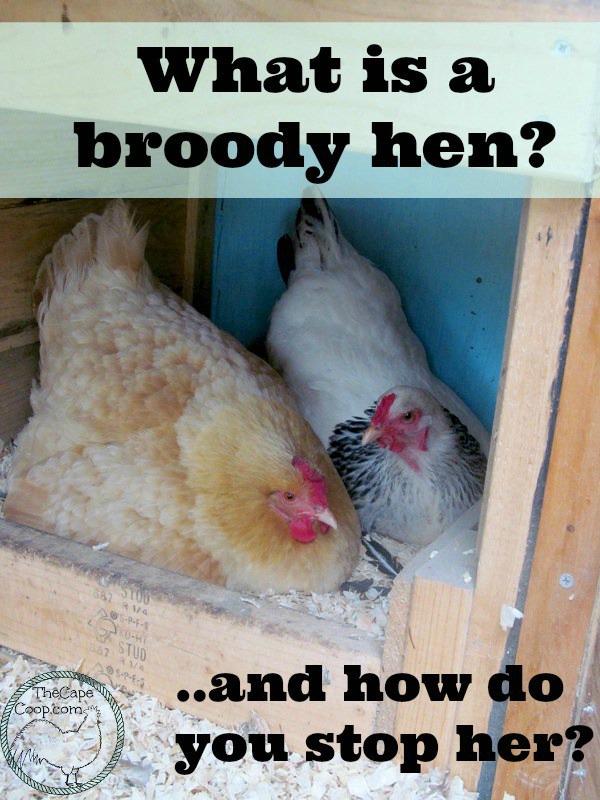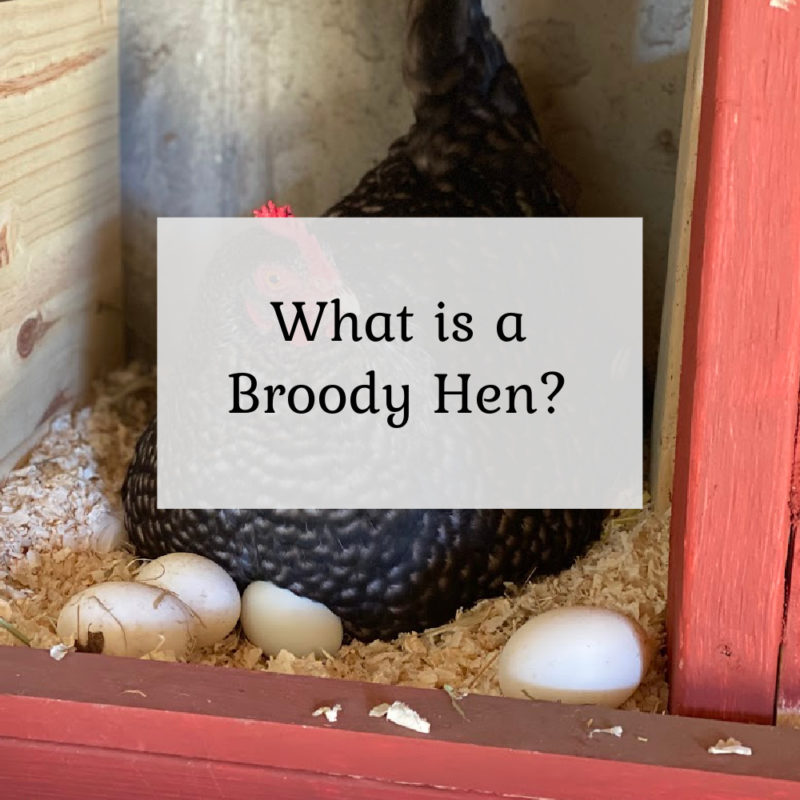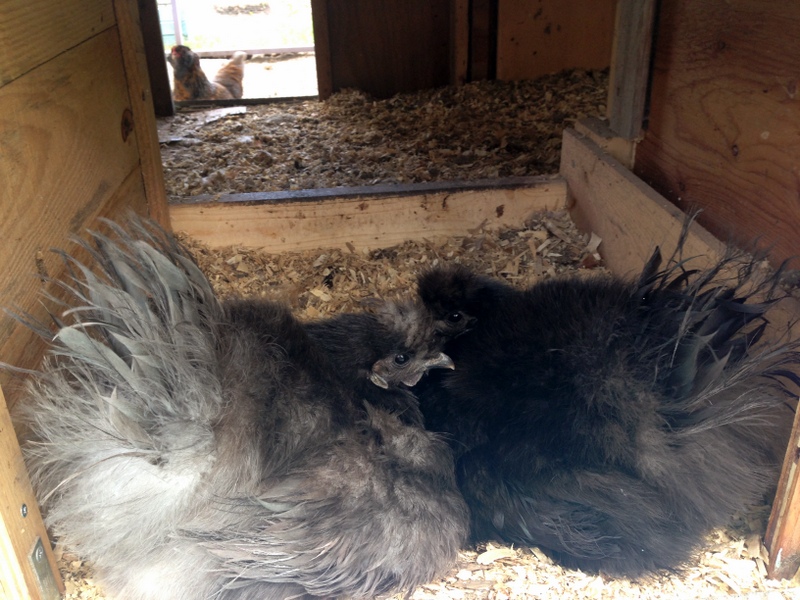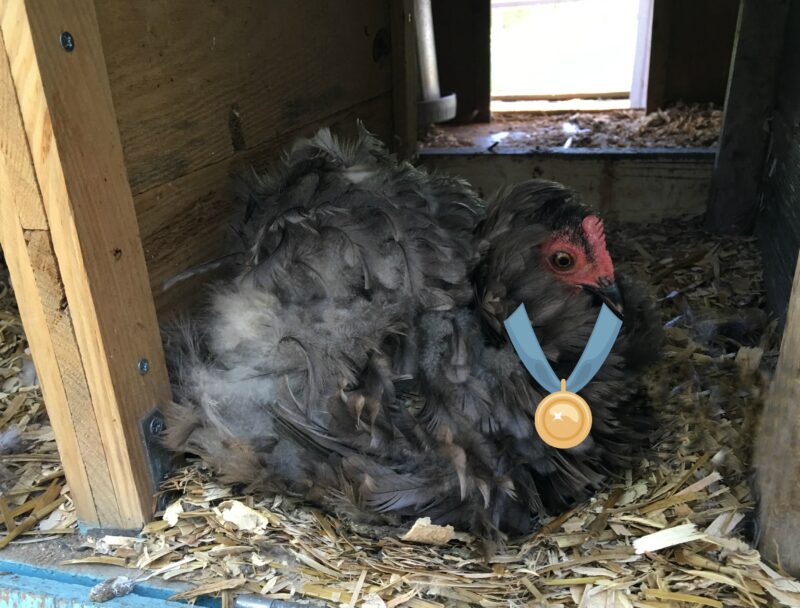---------------------------------------------------------
If you are raising chickens or ducks you are bound to come across the term “broody”. What does it mean, why does it happen and is it something you need to worry about?
Female chickens and ducks (and most of their wild bird relatives, and occasionally even some male birds!) have natural instincts that tell them it’s time to settle down and raise some babies. When these instincts take over, the hopeful mommy starts to gather a clutch of eggs. Sometimes she accumulates the eggs she lays herself over several days, but often she will steal her flock-mate’s unattended eggs to form her clutch. A typical clutch is about 12 eggs. She will pluck some of her feathers to not only “feather her nest”, but also so the eggs can make direct contact with her skin to keep them warm. Once her clutch size is complete, she will stop laying new eggs. She will sit on the eggs day and night; not leaving to roost at night, cutting back on her feed & water intake, getting up only when absolutely necessary. The hen will be very protective of her nest, puffing up her feathers, growling and pecking at intruders.
Scientifically speaking, the call to be broody is due to the secretion of prolactin hormone by the front lobe of the pituitary gland (in mammals this is the hormone responsible for stimulating milk production). Because some breeds are more likely to go broody than others, it is thought to also be an inherited trait. Obviously, commercial egg laying operations do not want hens going broody because the hens stop laying eggs while broody, so they have spent many years and lots of money breeding out the tendency for broodiness. Any breed can go broody, but these breeds in particular are known for their broodiness/non-broodiness:
Most broody chicken breeds – Cochin, Silkies, Buff Orpington, Brahma
Least broody chicken breeds – Any sex linked breed (Red Stars, Golden Comets, etc), Leghorns, Rhode Island Reds, Polish
Most broody duck breeds – Muscovies, Mallards & Welsh Harlequins
Least broody duck breeds – Runners, Pekins, Khakis
In general, chickens go broody more often than ducks. Lots of people will use their broody chickens to hatch out all kinds of eggs from chicken to duck, turkey to quail. Some chickens and ducks will never go broody in their entire life, some will go broody once a year, some will constantly be broody.
What to do when your hen is broody
So when you discover your girl is broody what are your options?
- Give her some eggs to hatch! If you have a rooster or a drake, you have an endless supply of fertilized eggs, but if you don’t have a male around, you can purchase fertilized hatching eggs from hatcheries, other local farmers, even on Ebay! Check out my post on hatching eggs with a broody hen here.
- Let her be and hope nature runs it course. As long as your hen is healthy going in, a few weeks being broody isn’t going to hurt her. Many times after about 3-4 weeks the hen will give up on her own when her eggs don’t hatch (even if you continue to take her eggs away everyday, she will just steal more the next day or just sit on an empty nest, her internal timeline unfazed).
- “Break” her of being broody. While some hens will naturally give up on the idea of being broody after a couple days or a couple weeks, some are more persistent. Particularly Cochin and Silkie chickens, they can be marathon brooders, being broody for months and months on end. Being broody for long periods of time can negatively effect your chicken or duck’s health (not to mention your egg supply). Feather pulling, not eating or drinking normally and not getting exercise are not good for her. Additionally, when a chicken stays out of everyday flock life for a long period of time she loses her place in the pecking order. She will be bullied by the other chickens when she does venture out of the nest possibly causing injuries.
How to break a broody hen
If you have a hen that is persistent in broody, there are a couple things you can do to help her give up her dreams of hatching some eggs. With some chickens this can be an ongoing, constant battle. I have a little frizzle cochin named Lucy who has made this almost a daily battle since she was about 5 months old.
First– to discourage broodies you need to collect eggs often. Sometimes just seeing a couple eggs sitting in the nest is enough to kick up the broody hormones.
Second– make a point of moving the broodies out of the nesting area whenever you see them there. If they are constantly forced to move it will discourage nesting behavior
Third- if after a couple days your hen is still intent on being broody you need to ramp up your intervention. The things a broody hen likes most are darkness, coziness, warmth and quiet. To break her you need to put her in just the opposite environment. Move her to a pen (a mini coop, dog crate or small wire rabbit hutch would work for this) that has a wire floor and walls. Do not give her any shavings or bedding (but don’t forget the feed & water!). Put the pen in the middle of the flock action during the day, somewhere she can’t hide in the shadows. If she is safe from predators you can leave her in the pen at night, if not put her back in the coop at night. Hopefully after a few days you will see her returning to normal and walking around her cage and then you can let her return to her flock.









Donna Hofmann
Monday 22nd of June 2020
We have a silkie mix that, after the second go round of breaking her broodiness, we let her set on 4 eggs. Just had the first hatch! An all black Australorpe/RI Red mix. (Adorable) I had been told that by constantly breaking her broodiness it would break her spirit & she might stop laying altogether. Is there any merit to this? She is an awesome mama but I have room for only so many chickens.
Liz
Tuesday 23rd of June 2020
I have never heard of this and it hasn't been my experience with my flock. It's really not healthy to let them continue being broody if they aren't hatching eggs. When they are broody, they aren't eating, drinking, or exercising as normal so it's best to break them and get them back to taking care of themselves.
Sondy
Wednesday 11th of July 2018
We have a barnvelder (sp) and she won’t leave the nesting box. We thought she was egg bound but I couldn’t find anything bound. Is this common for this breed and do you have any other input about how she is acting? Thank you Sondy
Liz
Thursday 12th of July 2018
Hi Sondy, Barnvelders have average broodiness, so it is definitely possible that is what she is doing. Is she growling or trilling at you (defending the nest) when you touch her? Is her comb a normal color? If she doesn't seem sick, she is most likely just broody. You can let her go and she will give up eventually or try to break her of it by continuing to remove her from the nest box
Cathy Avey
Tuesday 3rd of July 2018
I wish I had read this about two weeks ago! I would have gotten some fertile eggs and put under her. My daughter wants to start raising her own chickens, and I could have helped her start her new flock. My question to is, now thats it's been just over two weeks. Is it to late to put some fertile eggs under her?
Liz
Tuesday 3rd of July 2018
Is she still broody? Eggs take 21 days to hatch so most hens will try out being broody for a couple weeks and then lose interest if you keep taking their eggs. But there are lots of breeds (silkies, orpingtons, and Cochins to name a few) that are marathon broody hens and will just keep stealing eggs, keep trying to hatch eggs for sometimes months at a time. My silkies are broody for probably 6 months of the year! If your girl still looks interested you could give it a shot. Check out my post on hatching eggs with a broody for more information ? https://www.thecapecoop.com/hatching-eggs-with-a-broody-hen/